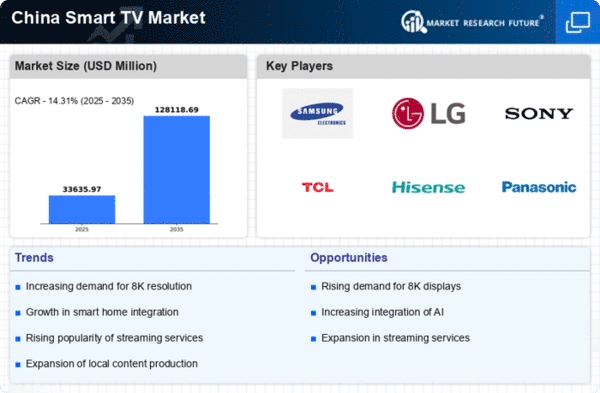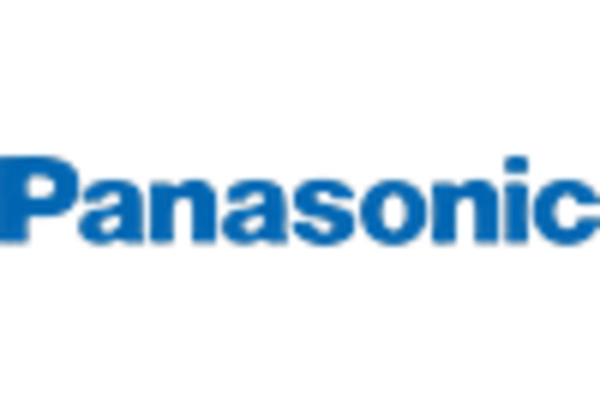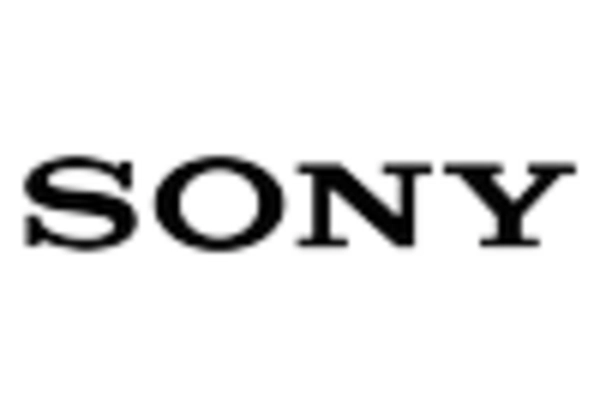Increase in Disposable Income
The increase in disposable income among Chinese consumers plays a pivotal role in the growth of the smart tv market. As economic conditions improve, more households are willing to invest in premium smart TVs that offer advanced features and functionalities. Reports indicate that the average disposable income in urban areas has risen by approximately 8% annually, leading to a surge in consumer spending on electronics. This trend suggests that the smart tv market is likely to benefit from a broader consumer base seeking high-quality entertainment options. Manufacturers are thus focusing on creating a diverse range of products to cater to varying income levels.
Expansion of Content Streaming Services
The proliferation of content streaming services in China significantly influences the smart tv market. With platforms such as iQIYI, Tencent Video, and Youku gaining immense popularity, consumers are increasingly seeking smart TVs that can support these services. As of November 2025, it is estimated that over 60% of households in urban areas subscribe to at least one streaming service. This trend not only drives the demand for smart TVs but also encourages manufacturers to optimize their devices for enhanced streaming capabilities. The smart tv market is thus witnessing a surge in demand for models that offer superior performance and compatibility with various streaming platforms.
Rising Popularity of Smart Home Integration
The rising popularity of smart home integration significantly impacts the smart tv market in China. As consumers increasingly adopt smart home devices, there is a growing demand for smart TVs that can seamlessly connect and interact with these devices. This trend is evident as approximately 40% of smart TV buyers express interest in features that allow for home automation and control through their televisions. The smart tv market is responding by developing products that enhance connectivity with smart home ecosystems, thereby creating a more cohesive and user-friendly experience for consumers. This integration is likely to drive further growth in the market.
Technological Advancements in Display Quality
Technological advancements in display quality are reshaping the smart tv market in China. Innovations such as OLED and QLED technologies provide consumers with superior picture quality, enhancing their viewing experience. As of 2025, it is projected that OLED TVs will account for approximately 25% of the smart TV sales in the country. This shift towards high-quality displays indicates a growing consumer expectation for immersive viewing experiences. Consequently, manufacturers in the smart tv market are compelled to invest in research and development to incorporate these advanced technologies into their product lines, ensuring they meet the evolving demands of consumers.
Growing Consumer Preference for Smart Features
The smart tv market in China experiences a notable shift as consumers increasingly favor smart features in their television sets. This trend is driven by the rising demand for integrated applications, streaming services, and voice control capabilities. As of 2025, approximately 70% of consumers express a preference for smart TVs that offer seamless connectivity with other smart devices. This growing consumer preference indicates a significant transformation in viewing habits, where traditional television usage is supplanted by interactive and personalized experiences. The smart tv market is thus adapting to these changing consumer expectations, leading manufacturers to innovate and enhance their product offerings to remain competitive.















